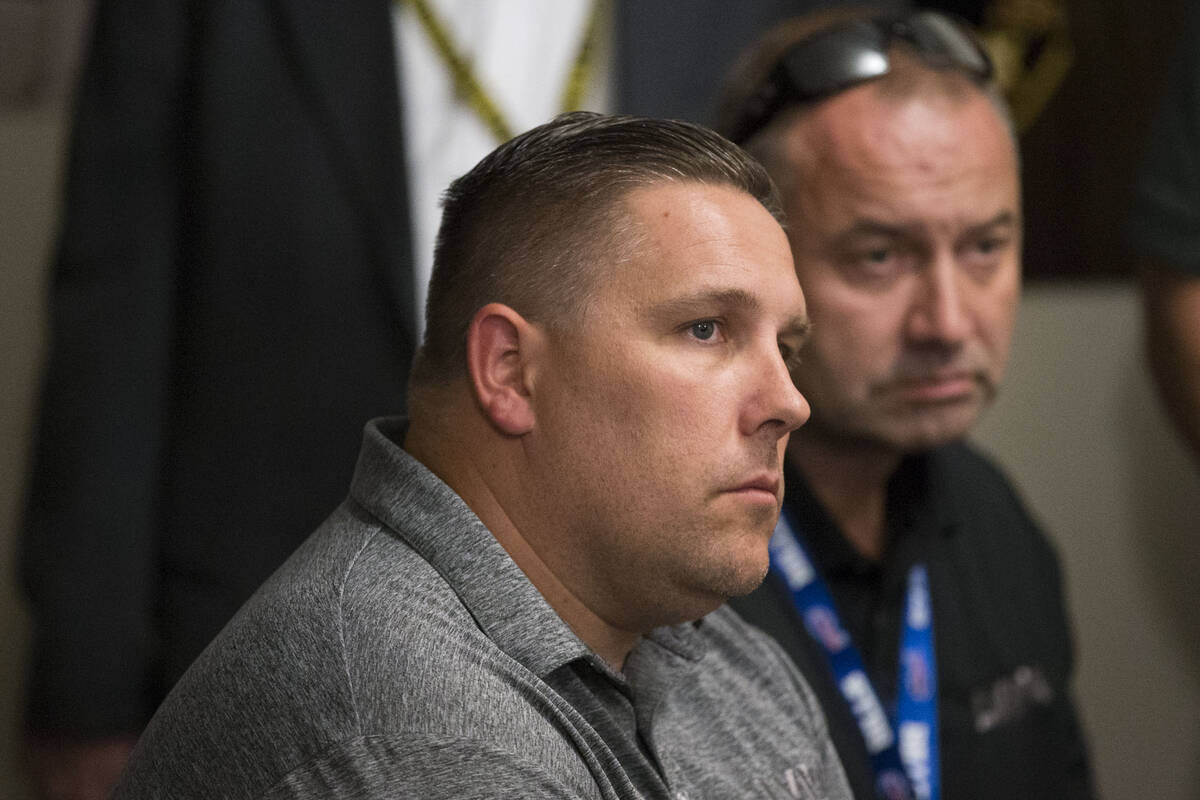5 bills police are watching this legislative session
Less than two weeks into the legislative session, Las Vegas police officers are closely watching more than a dozen bills that could affect officers’ daily work and the communities they patrol.
“There may be times that I call upon all of you to contact legislators about certain bills,” wrote John Abel, director of governmental affairs for the Las Vegas Police Protective Association, the officer’s union. “As cops, we all like to complain about the process and the outcome of elections, but when asked to take part in a process, we often become apathetic and have a sit-back-and-just-take-it approach.”
Abel addressed the legislative session in the union’s recent newsletter, and he opened a bill-tracking platform on the union’s website for officers to follow certain legislation.
Though bills are still being introduced, union President Steve Grammas laid out the top five the association was watching after the first week.
Ongoing addiction issues
Attorney General Aaron Ford sponsored Senate Bill 35, which would make trafficking fentanyl a separate felony, four to 14 grams being the lowest-level charge. Grammas said the union supports a bill to charge fentanyl separately, but they would like to see lower benchmarks.
“We know how little fentanyl you need to kill somebody,” Grammas said. “We have got to take something like that that’s more of a public health crisis and turn it to where four grams is too much. Four grams of fentanyl can kill 20 people.”
Nine legislators have signed onto Senate Bill 128, which would set the bar for low-level trafficking at four to six milligrams. Among those sponsors is Clark County Sen. Carrie Buck, R-Henderson.
“A (Drug Enforcement Administration) analysis has found counterfeit pills ranging from .02 milligrams to 5.1 milligrams,” Buck said in an interview with the Review-Journal. “Two milligrams is lethal. That’s like two grains of salt.”
The current statute sets low-level possession of a controlled substance at 100 to 400 grams.
“We want to send a message to anyone who is dealing in that sphere, 100 grams is not enough,” Buck said. “The consequence need to be a little tougher.”
Grammas, who has a background in narcotics investigations, said the union is closely watching Assembly Bill 115, which is at least the second time a safe injection site bill has been proposed.
Assemblyman and Dr. David Orentlicher, D-Las Vegas, sponsored the bill, which would provide a hygienic site for residents to consume drugs and seek medical attention for an overdose.
“What I’m trying to do is facilitate treatment and keep them safe while they are undergoing treatment,” Orentlicher said. “They’re not going to be cured overnight. This is a chronic disease, a chronic disorder, and some people are going to take more time than others to get it under control. We want to keep them safe from HIV, hepatitis and overdoses.”
Orentlicher said the site would offer resources for users to seek help, including rehabilitation centers and pharmacists who can prescribe medication to help with addiction.
“I hope we’re trying to deal with and treat dependents on narcotics, not providing a safe space to let you shoot up,” Grammas said. “Then having staff on-site to try and figure out how to revive you, because heaven forbid something goes wrong, now there’s culpability on those poor nurses. We should be figuring out how to get better treatment, more treatment for these folks.”
Grammas said he believed drug sales would be conducted outside a safe injection site, and he worried about people under the influence of drugs driving after leaving the facility.
Officer benefits
The union is working with legislators on two proposals that had not been drafted as of Thursday.
One proposal, sponsored by former Henderson police officer Toby Yurek, R-Henderson, would encourage officers to delay retirement in exchange for increasing their savings.
DROP, or deferred retirement option program, would allow first responders to retire on paper and stop contributing to their retirement fund, but the money would be locked into a savings account for a minimum of two years while the officer continued to work.
“The goal is to keep people from retiring so quick,” Grammas said. “We’re so far behind on bodies that we’re trying to figure out how to keep tenured folks from leaving.”
DROP would be open to all first responders and require them to stay in the job they were in when they locked the money into the savings account.
“On the heels of COVID and some of the challenges and criminal justice reforms, there are stats showing there is a lot of officers and firefighters retiring,” Yurek said. “Combined with the challenge of recruiting to fill these vacancies, it’s unsustainable turnover.”
Grammas also is hoping to see a qualified immunity bill that would mirror the federal standard, which protects officers from lawsuits unless they broke a clearly established law. A union survey found that most officers would not recommend working in law enforcement or doing proactive police work if they did not have qualified immunity.
“When someone makes a mistake, should we be causing our law enforcement to be so fearful of a simple mistake that they could be losing their savings accounts?” Grammas said. “That’s all we want, to make sure that folks feel when they are working honorably and make a mistake, they’re not going to open themselves and their families up to a lawsuit.”
Informant bill
The union is watching Assembly Bill 101, which would require prosecutors to tell defense attorneys certain information about jailhouse informants, including deals they received, the informant’s criminal history and what other cases they testified in.
“If people want to come forward, there’s ways for judges to know what the person was working off,” Grammas said. “To turn over a straight database, you would probably see a lot of deaths in this valley if we start doing that type of stuff or a lot of good cases may not be solved.”
The bill is sponsored by Assemblywoman Cecelia Gonzalez, D-Las Vegas, who is working with the Innocence Project and county district attorneys’ offices across the state. Gonzalez said the informants’ names would not have to be recorded.
“The DA cannot effectively use built-in safeguards against unreliable informants without a database,” she said. “Prosecutors must disclose discrediting people to defense. Jailhouse inmates are known to lie about other inmates for benefits.”
Gonzalez cited three local cases — DeMarlo Berry, Fred Steese and Kristin Lobato — that all resulted in wrongful convictions after jailhouse informants falsely testified that the three admitted to murders.
Contact Sabrina Schnur at sschnur@reviewjournal.com or 702-383-0278. Follow @sabrina_schnur on Twitter.



















